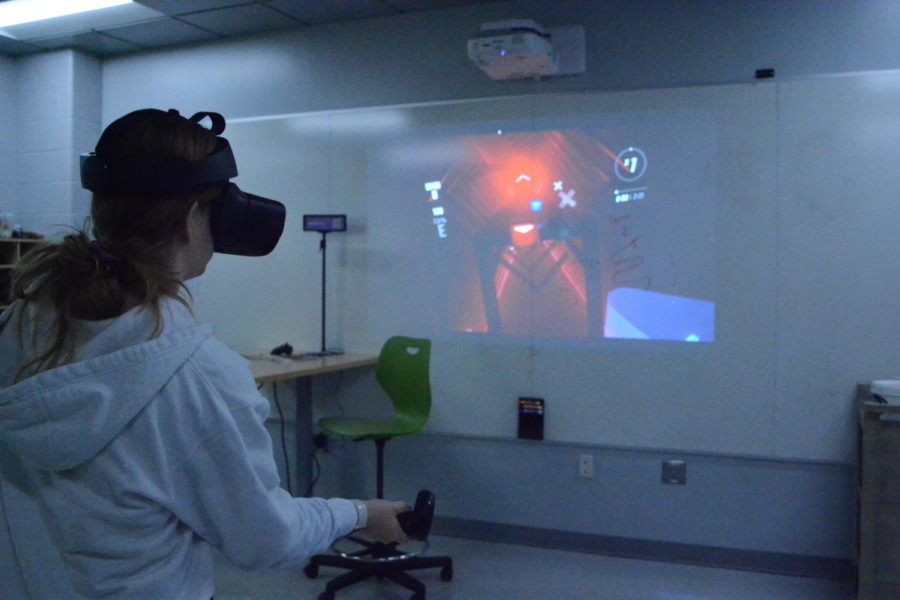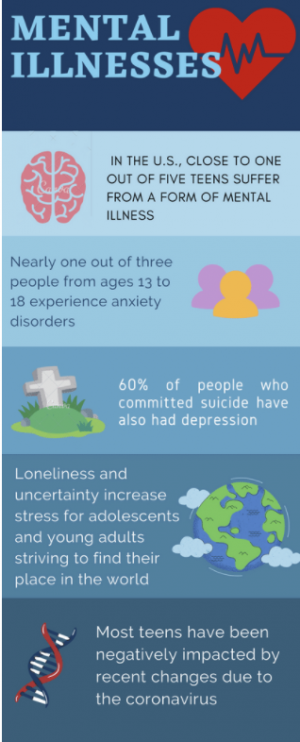Society ventures virtually into metaverse
Senior Emily Scott plays Beat Saber with VR in the Innovation Lab.
March 7, 2023
Not to be confused with Marvel’s cinematic multiverse, the metaverse is the future of modern technology, a 3D virtual world where people can work, shop and interact with each other without leaving the comfort of one’s own couch. While the metaverse remains largely incomplete, its foundation centralizes in a mix of virtual reality (VR) and augmented reality (AR), along with non–fungible tokens (NFTs) as virtual currency.
“The metaverse is basically a virtual reality game where you become an avatar and explore the world,” senior Riya Agarwal said. “You can walk around and do things you would normally do in real life, but instead, it’ll just be online.”
The concept of the metaverse has been around for over half a century according to TechTarget.com, but the term itself was first coined in 1992 by American sci–fi author Neal Stephenson in his book “Snow Crash,” in which a dystopian world of rich people escape into alternative 3D. “Ready Player One,” a sci–fi novel written by author Ernest Cline in 2011, describes humanity escaping in a shared virtual reality simulation world known as OASIS set in the 2040s.
“The idea of the metaverse has gone through various names, believe it or not,” programming teacher Matthew Keel said. “One of my strongest and earliest influences is ‘Ready Player One’ and ‘Ready Player Two.’”
Elon Musk, founder and CEO of SpaceX and Tesla, and Mark Zuckerberg, founder of Facebook and Meta Platforms, have both made strides to develop the metaverse.
“At the pace we’re going, the metaverse is going to be here really really soon, especially since Elon Musk is really bent on making this brain chip to implant in people instead of using VR headsets,” Agarwal said. “The implanted brain chip is going to grant easier access to the metaverse, which is a really scary future.”
The implementation of the metaverse raises the issue of privacy laws and concerns that will need to be addressed due to the lack of metaverse specific privacy regulations around data privacy, security, and safety, as data collection is capable of being very invasive, according to VentureBeat.com, as well as sexual harassment.
“I think there’s definitely a concern with user safety, and I think the metaverse will impact it,” junior Spencer Read said. “My guess is it will have to make those laws a lot tighter.”
Because the metaverse aims to transfer the real world completely virtual, it will completely alter daily lives and thus greatly impact the environment and sustainability by limiting travel emissions from cars and airplanes, both of which contribute significantly to global warming. However, with the decrease of air pollution comes the significant increase of energy consumption, according to Earth.org, with one AI language processing model found to have required over 620,000 pounds of carbon dioxide.
“To an extent, the metaverse would help with environmental issues,” senior Jessica Tian said. “However, the metaverse depends on electricity, and there are many environmental problems that come with the generation of electricity, as it creates greenhouse gases, destroys habitats and endangers other species.”
The potential of sustainability brings up other strong benefits of the metaverse, including being able to interact with anyone all over the world. According to Brunel University, the metaverse will help those with disabilities, such as giving people with limited mobility the same access to daily life as the able–bodied.
The immersiveness of the metaverse poses as both an innovative feature but also a concerning danger regarding the already significant technology addiction and decreasing mental health of the Internet world, according to FamilyAddictionSpecialist.com.
“The metaverse is going to blur the line between an actual human being in the room and a bunch of pixels on a VR headset,” senior Keith Scroggs said. “And that’s devastating for mental health because it’s trying to gaslight human emotions into trying to disbelieve this distinction that we’re wired as humans. The neurological pathways activated when interacting with a real human being and when interacting with a picture on a VR headset are different, and [the metaverse] tries to tell our brains that no, that distinction doesn’t exist.”
The economic success of the metaverse remains unknown, as it is too early to tell. Its future in becoming a daily part of society will be left up to developers and investors and how the users adapt to its integration.
Regardless if one decides to journey into the metaverse, one must be cautious of how far they are willing to go, and, if they can or ever want to return to reality.
“When I think about fears for the metaverse, I can’t help but think about ‘Wall–E’,” Keel said. “All the humans are 500 pounds, floating around on a floating wheelchair, never really experiencing the real world. I think the lack of movement and addictive nature of it all would be a huge fear.”







